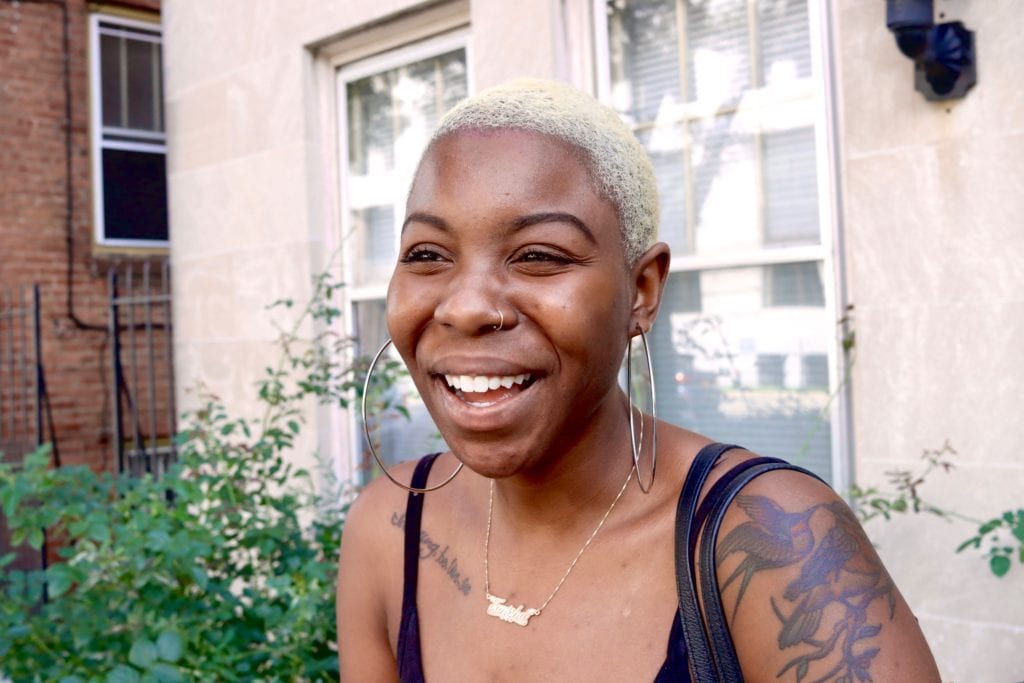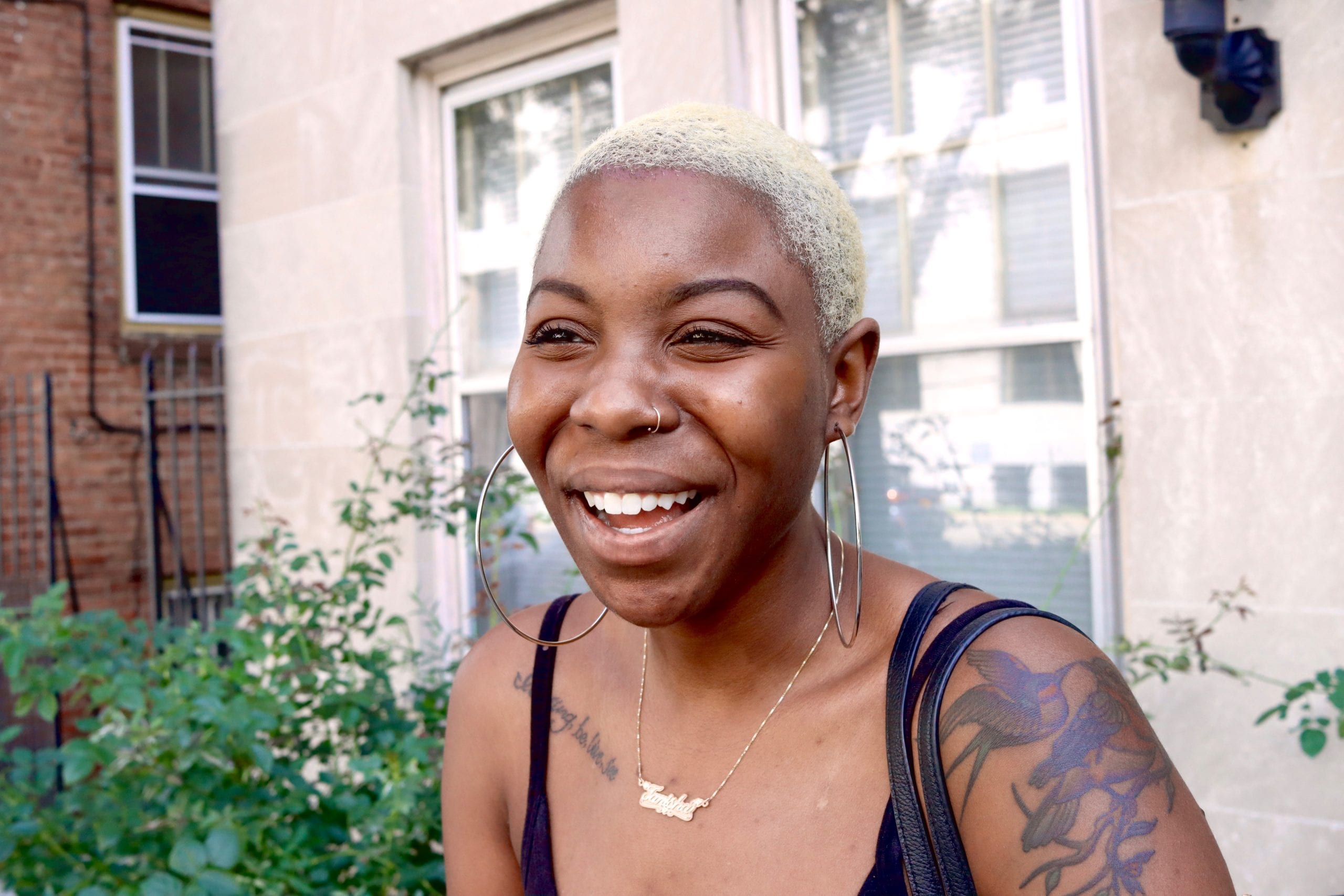
Tanisha Findley, a licensed practical nurse at a local assisted living facility, spoke with Albany Proper’s Shannon Straney about the challenges of being a nurse during the Coronavirus pandemic and being Black in healthcare.
————
// I know that you work in healthcare, but I don’t actually know what you do.
I’m a licensed practical nurse (LPN). Basically, licensed practical nurses are a step before a registered nurse (RN). Usually LPNs work in nursing homes, doctors offices, clinics, and group home settings.
I’ve been a nurse for three years. In a nursing home setting, specifically to me, RNs are usually managers. They manage the floor, they do the paperwork assessments, they talk to families. And then the LPNs are the med nurses. We pass the meds, we do the care, we do the feeding and if need be, we do showers.
I’m pretty good with the families, honestly. I know how to talk to people and make them feel reassured, which I think is one of my strong points as a nurse. Compassion. Making sure even when I’m talking on the phone, I feel the emotion and I try to ask them, “How are you doing?” I just always try, because I haven’t seen my mom in a month. And imagine not seeing my mom in six months? So I can understand when they’re like, “I need to speak to my mom.” They need the connection.
We’re doing window visits now, which are really cool.
// Like where guests stand outside?
Yeah, they stand outside and we bring the resident out into the hallway. I see the pain that people are going through when they can’t see their family members.
// How has it been with COVID?
It was hard for a long time. I wanted to quit a lot of times.
COVID got so bad that we had to clear out a whole floor. They cleared themselves out, mostly. Some people took their parents home, which I thought was a fantastic idea. A lot of people died. Even if they recovered, it’s just so… it takes such a toll on them they end up dying anyway. So technically they didn’t die from COVID, but they died from complications with their elderliness. It pushed them to the edge.
I was left by myself on one floor which is 40 people and half the floor had COVID. Aides were dropping off like flies. They were either getting sick or they were just too scared to come back to work. So I would be working with just two aides, which is not safe.
// How many aides is it usually?
It would be four to five aides.
// So that’s less than half of what you really need.
Yes, exactly. I was just advocating so much — we need more help, we need more help. “Well, nobody’s coming in. We’re short staffed again.”
It’s putting on the gown. You have to put it on in a special way. You take it off in a special way. You have to do it for every individual room.
So you put on the gown. Tie it up. Then you put on gloves. Then you have to put on your N95 mask. There’s a special way you put it on. You make sure it’s secure and snug and you can’t breathe. Then you put the shield on and you can’t see because you’re fogging up your shield. It’s hot. And you can’t touch your face! You can’t touch anything.
You go in the room. “HI!” There’s a space person coming in their room, so they’re like what the fuck is this?
It’s hard when you’re wearing a mask and you’re trying to talk to people. Especially if they’re deaf, basically. When they can’t hear you… “HI!” They don’t give us those clear masks, because you have to use the hospital grade masks. If you can’t see what I’m saying, you can’t hear what I need you to do.
Then you have to take it off. Do it again. Every single person. You don’t want to be cross-contaminating anything. Say you have 10 people – you have to do that 10 times over. Probably a couple times a shift, because it’s not like they get meds all at once.
And then you miss something, or maybe someone wants something. Then I have to put this all on again. You didn’t get to pee that day. You barely got to eat anything. You probably didn’t drink anything that day either, which is what happens. I barely have time to take my breaks. Sometimes I don’t even get a break.
// Are the people you’re taking care of talking about COVID? Or Black Lives Matter?
A lot of them don’t understand.
Some residents are people who are mentally aware, they just need care. Some people don’t even need somebody to really care for them, they just needed a room so they just decided to pay for this one. Those residents are a little bit more aware. They’ll wear their mask. They’ll go and visit and they’ll sit in the doorway while the other person’s in the room. They know what’s going on. They watch the news. They’re paying attention.
I have a lot of the residents with dementia. You tell them they can’t go outside. There’s a virus that will hurt you and we don’t want you to go outside. And then they’re like, “OK, OK. Can I go outside?”
“But why can’t I see my kids? Why can’t I see my husband? Why is nobody visiting me? Nobody’s visited me in months.” Those are the hard conversations. What can you tell them? What can you say?
A lot of the aides in the healthcare industry are Caribbean, African. The managers are — you know, they’re usually white. My manager is black, which I thought was very cool. But there comes a whole different area of THAT – being black and identifying with your black coworkers, but also not wanting to be lumped in with them because you’re supposed to be setting a standard. So that means acting a certain way and portraying yourself a certain way so no one will confuse you with anybody else. Being extra tough. Being extra mean. Being extra stern. No slack, no friends, no nothing. But you’re still something. You’re still black, or you’re still a woman, or you’re still this… I get it. So people are like, “I don’t like her.” I get why she’s that way.
You gotta be so much, all the time. You have to be the best, you have to be the smartest, you have to be the nicest. You can’t be ‘ghetto’. You can’t talk in slang, because… I don’t know. People are gonna think you’re something that you’re not.
“Oh yeah, that makes sense. Her name is Tanisha.”
You gotta deal with the regular stuff on top of the COVID stuff. I’ve been called every name in the book. This is gonna sound funny, but I think that it’s nursing, hands-on, with anybody. Because anybody can be racist. It’s just not good for the soul if you’re a black person. There’s just so much that you have to take. We already take this in our daily lives, so why go to work and also be subjected to such cruelty and such disregard for your humanity? And then have to say, well you took an oath when you took this job…
It’s almost as if they forget you’re human as well. You have to be superhuman. You have to deflect all the bad things. You have to get hit and bit and not bat an eye. You have to just put that smile on your face and keep it moving. You have to always be the bigger, better person, and it’s hard. It breaks you down. You’re putting your whole heart into this and you just get stomped out everyday.
The stress doesn’t outweigh the good moments that you might have. I love talking to people. I love hearing stories. That’s my favorite part of the job – getting to know people and where they’re from and what they did.
These people always have really cool pictures. It’s so cool to see 1940s wedding photos and how beautiful everybody looks. You just get a nice snapshot of history.
Seeing the progression of that to now – it gives you a good reason to want to do stuff with your life. Some people are like, “I’m so old, I’m 30.” It’s like, excuse me? I know a lady who’s 107 and she’s still walking around and just living her best life. Even though she’s getting older, she still wants to look good for herself. She does her hair. She puts rollers in and wears her jewelry and struts around the nursing home. And it’s just like — hell yeah.
// Are you afraid of getting COVID from working there?
No, not really anymore. I have to get tested every week. It used to be twice a week. If I get it, I get it. It can be anywhere. I’m not afraid of it anymore. I’m afraid of it for other people.
I’ve gotten so close to death that it’s just not a scary thing to die. I think the mode of how you die is scary. How you pass on, whether you get shot or hit by a car – that’s the scary part. But the dying part, I think, is pretty simple. You just have to be around the right people.
My aunt died last year. We went to Jamaica and they had a big, giant party for her and it was so cool. Even at the grave site, we were having a great time — drinking, dancing, playing music, singing. That’s kind of what I want to make it like. I want to make it like a Jamaican Nine-Night in the nursing home.
Once, this guy was passing away. This is my favorite story to tell. He had a great sense of humor, we just loved him. He’s passing and I could tell because his legs were turning colors. You die from the bottom up. He started turning purplish around his knees, so that’s how you know he’s got a couple hours left. If it progresses faster, if it’s up to his sternum… the hearts right there. So me, my two aides – it was like four o’clock in the morning and I was like, “I think he’s gonna be going soon. We gotta send him off.” So we started singing The Final Countdown. I called his daughter and I had him on the phone and we’re singing, “It’s the final countdown! Do-do-do!” And she was just laughing.
You’re taking the best journey you can take. You’re getting the hell out of dodge and that’s sick. So, always — medicine, comfortability. Music is being played. They’re constantly being changed. They’re constantly having their mouths cared for, cause you don’t want someone to have a cracked up mouth. And even if they’re dying, you want to make them look good, you know?
It’s a lot of responsibility.

